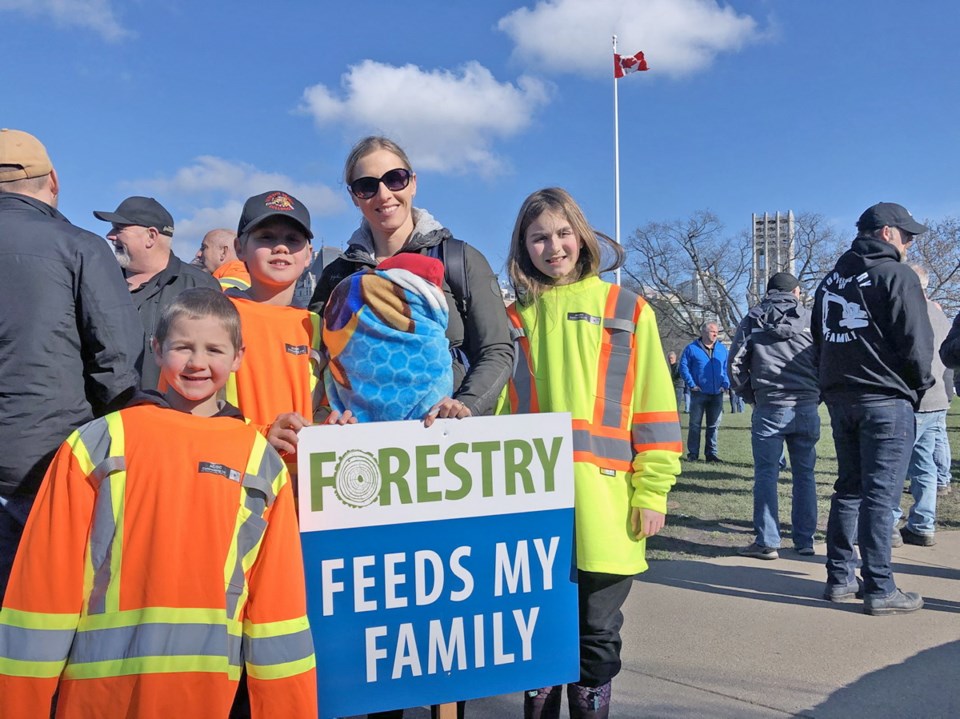The Swansons of Port Alberni were at a forestry rally outside the B.C. legislature on Tuesday, asking on the day of the provincial budget for the government’s support of their industry.
Ryan Swanson, who with wife Melissa runs AC/DC Contracting, saw his bank account “devastated” during an eight-month dispute between Western Forest Products and the United Steelworkers Local 1-1937 that was settled this month. He is still making payments on equipment, about $25,000 a month, that has been shut down.
The Swansons, who have four children age five months to 11 years old, say the stress on their family is being felt the strongest now as they await the industry to restart and wait to hear if the province is going to support their bread and butter industry.
“It’s an ever-shrinking industry,” said Ryan Swanson.
“They keep cutting everything which makes it a more starving industry which makes it less profitable which makes it harder to make a buck.”
The B.C. Forestry Alliance Save the Working Forest rally saw hundreds of forestry industry-related workers, from as far as Prince George on the mainland and Port Hardy on the Island — as well as a convoy of about 20 commercial trucks — gathered on and around the lawns of the B.C. Legislature on Tuesday. Some held signs reading “Forestry Feeds My Family.”
Swanson was one of many there to ask the premier “to support the working people of this province, the people who support this province, the people who support the government.”
Forests Minister Doug Donaldson said he spoke with Alliance members at the rally and told them “our government will support the thousands of people who rely on the forest sector for their jobs and livelihoods.
“We will continue to work with the sector to address challenges and ensure a bright and sustainable future,” Donaldson said.
“This includes our hard work on our Coast Forest Sector Revitalization plan to make sure more logs are processed in our province and reducing wood waste by redirecting it to our pulp and paper mills.
Inside the legislature, Finance Minister Carole James might have talked about the government not turning its back on the forest industry — “the people who have helped power our province for so long” — but it didn’t translate to much in Tuesday’s budget.
The budget included $13 million for what James called forestry revitalization efforts that would look at new options for the “bio-economy” [turning waste wood into fuel and value-added products] as well as promoting B.C.’s innovation and wood products.
The new funding comes against a backdrop of crisis in the woods.
On the coast, following the strike that sidelined more than 5,000 workers, it will be weeks before logging and production will be up and running.
Meanwhile, the Interior forest industry has been licking its wounds after a rash of mill closures and curtailments due to timber supply as a result of pine beetle infestation and wildfires.
Both the Coast and Interior industries have been dealing with depressed markets, low timber prices, the softwood lumber dispute with the U.S., high government fees [stumpage rates] and timber supply issues.
The province pledged $69 million last year in relief for the Interior — money to be used to fund early-retirement assistance and help with retraining and job placement.
In January, the government offered a $5 million fund for bridge loans for logging contractors feeling the pinch of the coastal strike. No one has applied for a portion of that $5 million pot.
James said several times on Tuesday that funding is a short-term solution and that the government is committed to a long-term revitalization effort.
“The revitalization work is just getting started,” she said, noting it will require bringing all stakeholders together to ensure a sustainable industry.
Outside, rally organizer Carl Sweet, of Campbell River, delivered to Donaldson a petition containing more than 8,000 signatures in support of protecting the working forest and harvestable land base on coastal British Columbia.
The province commissioned an independent, two-person panel to hear people’s views on the economic, ecological and cultural importance of old-growth trees and forests. It expects to hear back from the panel in the spring.
Sweet said those in the industry fear that, as part of the review, “there will be a further reduction to the harvestable land base.”
Donaldson said he appreciated the input he received from Alliance members “and I can assure them that our government is more than willing to work with them to build a better future for B.C.’s forestry sector.”
Sweet brought his daughters —Karys, eight, and Mackenzye, 11 — to the rally. Despite challenges and downturns in the forestry sector, Sweet said he believes forestry has a great future.
“It’s renewable, it’s sustainable, it’s the greenest resource in the world,” said Sweet, who sells logging and construction equipment.
“I don’t think I’d want to be involved in anything else.”
Port McNeill Mayor Gaby Wickstrom said the strike has shown her town “what life could be like if there are further pressures on our industry, such as a ban on old-growth logging.
“It’s very important for us to come here today and show support and lobby the government to let them know we need some support and consideration.”
CINDY E. HARNETT
and ANDREW DUFFY
Times Colonist



